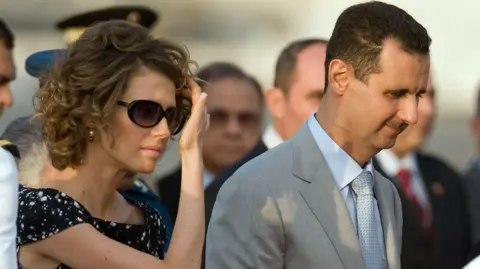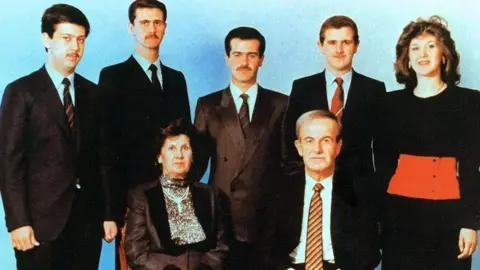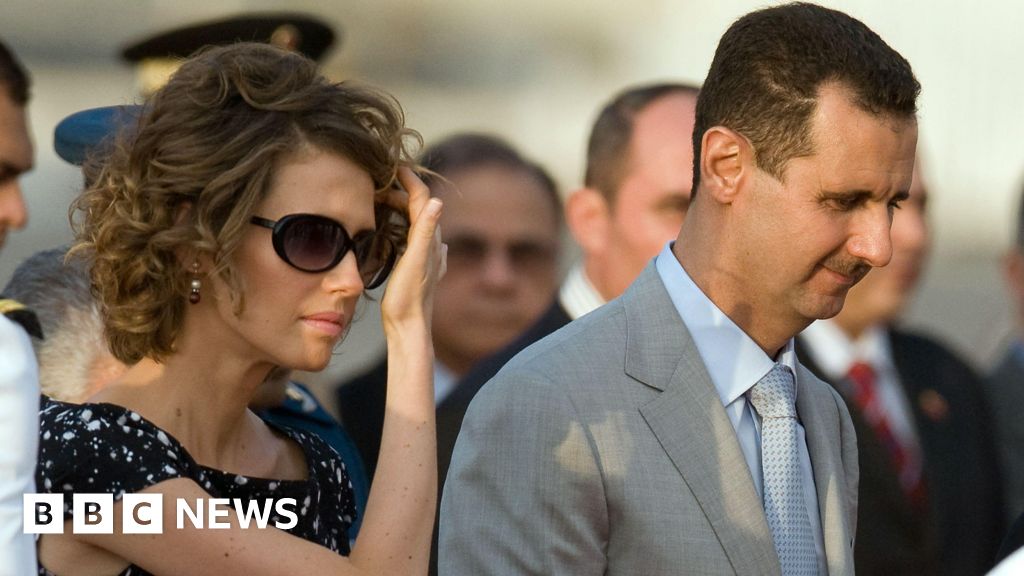 Getty Images
Getty ImagesWhen Bashar al-Assad was toppled on Sunday, it turned the page on not only his 24-year presidency but on more than 50 years of his family ruling Syria.
Before Assad took office in 2000, his late father Hafez was president for three decades.
Now, with rebels led by the Islamist militant group Hayat Tahrir-al Sham (HTS) forming a transitional government, the future of the deposed president, his wife and their three children is uncertain.
They are now in Russia, where they have been offered asylum, but what lies ahead for them?
Why did Assad flee to Russia?
Russia was a staunch ally of Assad during Syria’s civil war and has two key military bases in the Middle Eastern country.
In 2015, Russia launched an air campaign in support of Assad that turned the tide of the war in the government’s favour.
A UK-based monitoring group reported that more than more than 21,000 people, including 8,700 civilians, were killed in Russian military operations over the following nine years.
However, distracted by its war in Ukraine, Russia was either unwilling or unable to help Assad’s government stop the rebel’s lightning offensive after it began in late November.
Hours after rebel forces seized control of Damascus, it was reported by Russian state media that Assad and his family had arrived in Moscow and that they would be granted asylum on “humanitarian grounds”.
But when Kremlin spokesman Dmitry Peskov was asked about Assad’s whereabouts and asylum claim by reporters on Monday, he said: “I have nothing to tell you… right now. Of course, such a decision [on granting asylum] cannot be made without the head of state. It is his decision.”
The Assads’ ties to Russia, specifically Moscow, are well-documented.
A 2019 investigation by the Financial Times found that Assad’s extended family had purchased at least 18 luxury apartments in the Russian capital, in a bid to keep tens of millions of dollars out of Syria during the civil war.
Meanwhile, Assad’s eldest son, Hafez, is a PhD student in the city – with a local newspaper reporting just last week about the 22-year-old’s doctoral dissertation.
Amid the chaos at the weekend, Russian state TV reported that officials in Moscow were in talks with “the Syrian armed opposition” to secure Russia’s bases and diplomatic missions.
Who are Assad’s wife and children?
Assad is married to a dual British-Syrian national, Asma, who was born and raised in west London to Syrian parents.
She attended school and university in London before becoming an investment banker.
Asma moved to Syria full-time in 2000 and married Assad around the time he succeeded his father as president.
Dr Nesrin Alrefaai, a visiting fellow at the London School of Economics and Political Science (LSE), told BBC News that Asma “holds a British passport, so could return to the UK” instead of remaining in Russia.
“However, the USA [has] imposed sanctions on her father, Dr Fawaz al-Akhras, who is also reported to be in Russia,” she said – suggesting Asma may want to stay put in Moscow for now.
In a report by the Mail Online, neighbours were quoted as saying Asma’s father, a cardiologist, and mother Sahar, a retired diplomat, wanted to be in Moscow to “console” their daughter and son-in-law.
Assad and his wife have three children: Hafez, the PhD student, Zein and Karim.
 Getty Images
Getty ImagesA 2022 US State Department report to Congress said the extended Assad family’s net worth was between $1bn (£790m) and $2bn (£1.6bn) – though it noted that it was difficult to estimate because their assets are “believed to be spread out and concealed in numerous accounts, real estate portfolios, corporations, and offshore tax havens”.
According to the report, Bashar and Asma maintained “close patronage relationships with Syria’s largest economic players, using their companies to launder money from illicit activities and funnel funds to the regime”.
It also said that Asma had “influence over the economic committee that manages Syria’s ongoing economic crisis” – and had made key decisions on Syria’s “food and fuel subsidies, trade and currency issues”.
She also exerted influence over the Syria Trust for Development, through which most foreign aid for reconstruction in regime-held areas was channelled.
In 2020, then-Secretary of State Mike Pompeo alleged that Asma had “become one of Syria’s most notorious war profiteers” with the help of her husband and her family.
Another senior Trump administration official described her as the “business head of the family” and an “oligarch” who had been competing with Bashar’s cousin Rami Makhlouf.
He is one of Syria’s richest men and the family rift became public knowledge after he posted videos on social media complaining about his treatment.
Could Assad face prosecution?
Following the fall of the Assad dynasty, Amnesty International’s secretary general Agnès Callamard said Syrians had been subjected to what she called “a horrifying catalogue of human rights violations that caused untold human suffering on a vast scale”.
This includes “attacks with chemical weapons, barrel bombs, and other war crimes, as well as murder, torture, enforced disappearance and extermination that amount to crimes against humanity”.
She called on the international community to ensure that people suspected of breaking international law and other serious human rights violations must be investigated and prosecuted for their crimes.
On Tuesday, the Islamist rebel leader in Syria said any of the ousted regime’s senior officials found to have been involved in torturing political prisoners would be named.
Abu Mohammed al-Jolani also said his so-called Syrian Salvation Government would seek to repatriate officials it identified who fled to another country.
In France, investigative judges have sought an arrest warrant for Assad for alleged complicity in crimes against humanity and war crimes, in connection with a deadly chemical attack in Syria in 2013 under the legal concept of universal jurisdiction.
Russia does not extradite its own nationals – a legal process whereby someone is returned to another country or state to face trial for a suspected crime.
Assad is unlikely to leave Russia to go to a country where he could be extradited back to Syria or any other that might charge him with a crime.


Leave a Reply